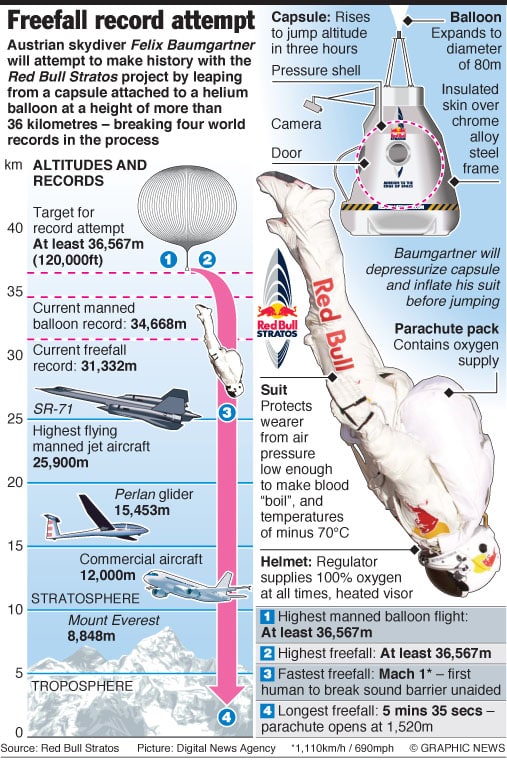Letölthető tartalmak
Freefall from the edge of space

Later this year Austrian skydiver Felix Baumgartner will attempt to break four world records, including being the first person to break the speed of sound during a free fall. Baumgartner will climb to 36,576 metres (120,000 feet) in a special pressurized capsule that will use a 140-metre helium balloon to lift it to the edge of space. Then wearing a special spacesuit, like those worn by NASA astronauts, he will step out of the capsule and free fall to Earth, breaking the speed of sound after about 35 seconds. He is expected to travel 1,190 km/h.
If all goes well, Baumgartner hopes he will also break three other world records that have remained unbroken for about 50 years, includingthe highest manned balloon flight; the highest skydive and the longest free fall. One puncture to his suit could mean instant death. The air pressure is so thin that without oxygen he would suffocate. His blood would boil because the boiling point of liquids fall as pressure falls. After five minutes of free fall, Baumgartner plans to open his parachute and land safely on Earth. But if he goes into a spin, it could cause him to black out, making it unlikely that he would survive.
Baumgartner and his team are now doing last-minute tests at Roswell, New Mexico, and it seems the attempt, sponsored by Red Bull, is a go. This isn’t the first time Baumgartner has taken on what appears to be a death-defying feat. He has jumped off the Petronas Towers in Malaysia and he has base jumped – or parachuted from low altitudes – off the right arm of the statue of Christ the Redeemer in Rio de Janeiro in Brazil.
In 2003, he became the first man to skydive across the English Channel, using carbon wings attached to his body. Born in 1969, he began skydiving at 16. In 1988 he began performing skydiving exhibitions for Red Bull
Baumgartner isn’t alone in his attempt to break this record which was set in 1960. Michel Fournier, a 67-year-old retired colonel from the French army, is also hoping to attempt to do the jump later this year.
He tried to do it in 2008, but it never happened after his balloon broke free and floated off into the sky as he was about to goinside his capsule.
skydiver[ˈskaɪdaɪvə] – ejtőernyős
to attempt [tu əˈtempt] – megkísérel, megpróbál
to break a record [tə breɪk ə rɪˈkɔːd] – megdönt egy rekordot
including [ɪnˈkluːdɪŋ] – beleértve
speed of sound [spiːd əv saʊnd] – hangsebesség
free fall [friː fɔːl] – szabadesés
to climb [tə klaɪm] – mászik, felmászik
pressurized [ˈpreʃəraɪzd] – túlnyomásos
capsule [ˈkæpsjuːl] – kapszula
helium balloon [ˈhiːlɪəm bəˈluːn] – héliumos ballon
edge of space [edʒ əv speɪs] – az űr határa
spacesuit [ˈspeɪs suːt] – űrhajós ruha
astronaut [ˈæstrənɔːt] – űrhajós
to be expected to [tə bi ɪkˈspektɪd tuː] – el van várva, hogy
if all goes well [ɪf ɔːl ɡəʊz wel] – ha minden jól megy
to remain unbroken (record) [tə rɪˈmeɪn ˌʌnˈbrəʊkən rɪˈkɔːd] – megdöntetlen marad (rekord)
puncture [ˈpʌŋktʃə] – lyuk, szúrás, defect
instant [ˈɪnstənt] – azonnali
air pressure [eə ˈpreʃə] – légnyomás
to suffocate [tə ˈsʌfəkeɪt] – megfulladni
boiling point [ˈbɔɪlɪŋ pɔɪnt] – forráspont
spin [spɪn] – forgás, pörgés
to black out [tə blæk aʊt] – elsötétít, elsötétül, elájul
unlikely [ʌnˈlaɪkli] – nem valószínű
attempt [əˈtempt] – kísérlet
to appear [tu əˈpɪə] – megjelenik
death-defying feat [deθ dɪˈfaɪɪŋ fiːt] – halállal játszó mutatvány
parachuted [ˈpærəʃuːtɪd] – ejtőernyővel ellátott
wing [wɪŋ] – szárny
to perform [tə pəˈfɔːm] – előad
exhibition [ˌeksɪˈbɪʃən] – kiállítás, bemutató
retired colonel [rɪˈtaɪəd ˈkɜːnəl] – nyugalmazott ezredes
to break free [tə breɪk friː] – elszabadul
to float off into the sky [tə fləʊt ɒf ˈɪntə ðə skaɪ] – felszáll az égbe


